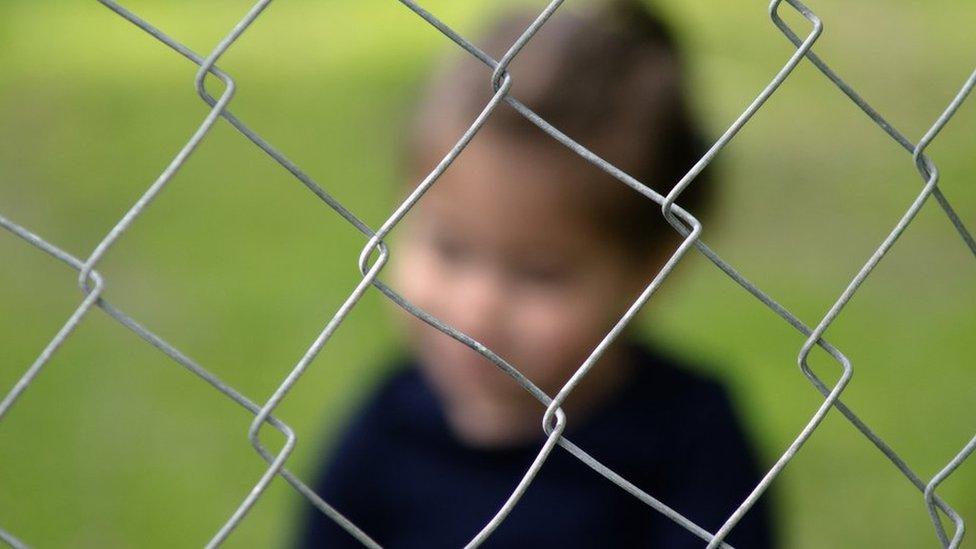'Duty to notify' plan to tackle human trafficking
- Published

Public sector workers could be given a greater role in helping police identify victims of human trafficking and exploitation.
The Scottish government is to consult on plans to introduce a "duty to notify" which would apply to health and social workers.
Social workers want to ensure any changes do not discourage vulnerable people from accessing services.
But ministers said many trafficking cases currently go unreported.
They said information collected through the proposed notification scheme would provide a more accurate picture of the scale and extent of trafficking in Scotland, and enable more effective targeting of enforcement activity and support services.
It would identify and support victims, identify perpetrators and disrupt their activity, as well as addressing conditions that foster trafficking and exploitation.
Hidden crime
Launching the consultation, Justice Secretary Humza Yousaf said: "Human trafficking is a hidden and often complex crime meaning the true scale of the problem is unknown.
"Victims may be reluctant to acknowledge their own situation for reasons including fear of their traffickers, distrust in the authorities and a lack of awareness that there are agencies that can support them to safety and recovery.
"These plans will create a statutory duty on Scottish public authorities to ensure that the information obtained by Police Scotland is publicly available. This intelligence will ultimately help us to protect and support more vulnerable people."
Currently the only available data on the numbers of trafficking victims in Scotland is taken from the UK National Referral Mechanism (NRM) - a framework for identifying potential victims of trafficking and ensuring they receive appropriate support and assistance.
For those victims who do not consent to enter the NRM, no data is recorded.

Since the NRM's introduction, recorded numbers of victims have increased across the UK. In Scotland there has been a 130% increase in referrals to the NRM in the last six reported years.
In September 2018 a pilot scheme began at Glasgow Airport involving Border Force and Police Scotland's National Human Trafficking Unit (NHTU) which resulted in 40 referrals to the unit in its first nine months.
The Scottish government has published some examples of the way public bodies are already co-operating , externalwith police to tackle human trafficking.
They include the actions of firefighters called to an address in Glasgow where a 17-year-old female had jumped out of window of a locked bedroom, suffering a lower fractured spine, fractured pelvis and broken elbow.
They informed police, who began an investigation which revealed the woman had been sexually exploited in China and in the UK. She has been supported by social workers.
'Hostile environment'
Assistant Chief Constable Gillian MacDonald welcomed the proposal to increase the amount of information police receive.
She said: "The introduction of a 'duty to notify' is a positive step which will help us work with other public services to further develop our collective approach to protecting survivors.
"It will also assist in helping victims to escape the clutches of traffickers, as we work to make Scotland a hostile environment for this type of inhumane criminality."
Apart from public authorities, such as the Scottish Ambulance Service and the national fire and rescue service, the new scheme could also include NHS boards.
Malcolm Wright, Chief Executive of NHS Scotland, said: "Victims of human trafficking may be deeply traumatised and distrustful of authorities which may affect their ability to seek help, support and treatment for any injuries they have sustained as a result of their situation.
"All clinical and non-clinical staff across the NHS in Scotland can play a pivotal role in identifying potential victims of human trafficking and exploitation that may otherwise go unnoticed or remain invisible."
Council staff
Scotland's 32 local authorities, including their social work departments could also be included in the "duty to notify" scheme.
The national director of the Scottish Association of Social Workers (SASW), Alistair Brown gave a broad welcome to the proposals.
He said: "We are glad to see that compared to other mandatory reporting proposals it seems the burden does not fall disproportionately on social workers, which is essential as stopping these criminal gangs is everybody's business.
"It is important to highlight, that as there has been minimal consultation thus far we are keen to ensure that following feedback, members do not feel that these plans discourage the most vulnerable people from accessing our services.
"In addition, it is essential that any new reporting methods be modern, streamlined and efficient as possible, for our own research shows that our members are already doing an average of 11 hours unpaid work per week."